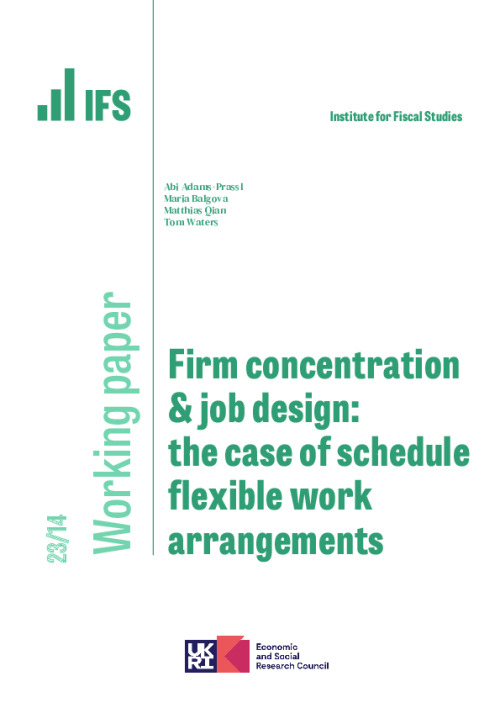Downloads
We build a model of job design under monopsony that yields predictions over the relationship between: (i) the amenity value of non-wage job features; (ii) whether they are costly or profitable to firms; (iii) monopsony power. We analyse the amenity value of schedule flexibility offered in the labour market by combining our model’s predictions with a new measure of schedule flexibility, which we construct from job vacancy text using a supervised machine learning approach. We show that the amenity value of schedule flexibility depends crucially on whether it is offered alongside a salaried contract that insures workers from earnings variation.
Authors

Research Fellow University of Oxford
Abi's research sits within Applied Microeconomics, often focused on the econometrics of consumer and family choice.

Associate Director
Tom is an Associate Director at the IFS and Head of the Income, Work and Welfare sector.
Research Associate Institute of Labour Economics
Research Fellow Said Business School, University of Oxford
Working Paper details
- DOI
- 10.1920/wp.ifs.2023.1423
- Publisher
- Institute for Fiscal Studies
Suggested citation
Adams-Prassl, A et al. (2023). Firm concentration & job design: the case of schedule flexible work arrangements. 23/14. London: Institute for Fiscal Studies. Available at: https://ifs.org.uk/publications/firm-concentration-job-design-case-schedule-flexible-work-arrangements (accessed: 30 June 2024).
Datasets used
More from IFS
Understand this issue

Big firm, little firm: are differences between companies driving inequality and holding back growth?
30 August 2023

If you can’t see it, you can’t be it: role models influence female junior doctors’ choice of medical specialty
24 April 2024

Retirement is not always a choice that workers can afford to make
6 November 2023
Policy analysis

How do the last five years measure up on levelling up?
19 June 2024

The Conservatives and the Economy, 2010–24
3 June 2024

A decade and a half of historically poor growth has taken its toll
3 June 2024
Academic research

The impact of labour demand shocks when occupational labour supplies are heterogeneous
28 June 2024

Labour market inequality and the changing life cycle profile of male and female wages
15 April 2024

Interpreting cohort profiles of lifecycle earnings volatility
15 April 2024
